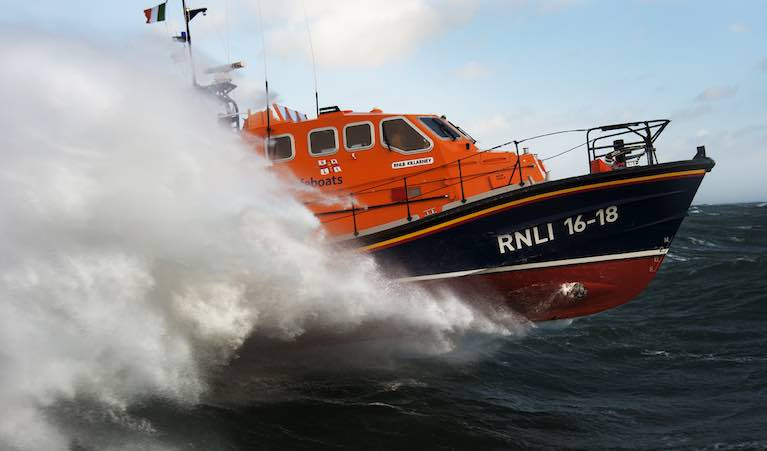A Wexford family has expressed thanks to the volunteers of Kilmore Quay RNLI who brought them to safety earlier this summer when their pleasure craft got into difficulty.
James Kehoe and his grandchildren Aisling, 13, Emily, 9, and Orla, 7, were rescued when their 7m boat broke down having sustained engine failure in Ballyteigue Bay, half a mile north west of Forlorn Point in county Wexford. The lifeboat under Coxswain Aidan Bates, went to the family’s aid and towed the vessel safely back to Kilmore Quay.
Such was seven-year-old Orla’s delight at being rescued by the lifeboat, she has since created a scrapbook about her adventure.
 Emily, Aisling and Orla
Emily, Aisling and Orla
It also transpires that the family have a close RNLI connection with James’ late father and the girls’ great grandfather, Jimmy Kehoe, a former station mechanic who was awarded a Thanks of the Institution Inscribed on Vellum, by the RNLI, for his part in a dangerous rescue off the Saltee Islands 63 years ago.
Jimmy was one of seven crew members on the Kilmore Quay lifeboat Ann Isabella Pyemont, which successfully rescued 10 seamen from the ill-stricken French trawler Augusta Mariste, in a fresh south to southwesterly gale with gusts at times of Force 10, in Ballyteigue Bay on the 19 December 1957.
Kilmore Quay RNLI Coxswain Aidan Bates said: ‘We were delighted to be able to help the family during the summer and tow the vessel back to safety. It was lovely to hear that Orla went to such efforts to create a scrapbook about the rescue and to be reminded of the girls' great-grandfather Jimmy, one of seven former Kilmore Quay RNLI volunteers who were deservedly recognised for their selfless bravery and courage all those years ago.’
 Orla
Orla
James Kehoe, skipper of the boat and the girls’ grandfather said: ‘It was good to experience the professionalism of the lifeboat crew through the eyes of my seven-year-old granddaughter Orla who took such a personal interest in the operation from start to finish.
‘When at sea with small children and the unexpected happens, it is so important to do the right thing. A good ship to shore communications system enabled me to contact Rosslare Coast Guard Radio – which is manned 24/7 – give my exact position and explain the situation. There is an instant response and the system works flawlessly.
‘Kilmore Quay RNLI has a proud history going back several generations. The current incredibly powerful all-weather boat is state of the art in terms of nautical sophistication. We always need to bear in mind that the service is manned by men and women who volunteer as crew members and who are prepared to take to the sea on a rescue mission in the most appalling weather conditions. Nothing will deter them in a real-life threatening emergency.
‘It is so important to remember that this incredible service is funded by voluntary donations. This year Covid-19 has meant the cancellation of the annual Lifeboat Day which is a significant fundraising event for the RNLI so next time you see that lifeboat box on a shop counter – be generous.’































































